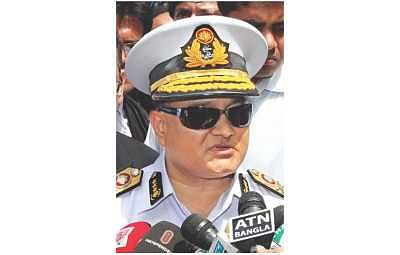PM was advised to go for negotiations

The three chiefs of the armed forces had suggested that the prime minister negotiate with the mutineers rather than go for military action during the February 25-26 BDR mutiny in 2009.
Vice Admiral Zahir Uddin Ahmed, chief of staff of the Bangladesh Navy, made this deposition yesterday before the special court dealing with the BDR mutiny case.
The Navy chief was the first high-profile witness to depose before the Metropolitan Sessions Judge's Court set up temporarily at Bakshibazar in the capital.
He said he had come to know about the mutiny through the intelligence director at around 10:00am on February 25, 2009. He went to the premier's official residence Jamuna at 1:00pm on the day in response to a call from the Prime Minister's Office (PMO). The army and air force chiefs were also there.
At a meeting with the defence chiefs at 2:30pm, the PM said she had two options in hand, negotiations and military action. Since the situation inside Pilkhana, the BDR (later renamed as Border Guard Bangladesh) headquarters, was not clear, military action was not possible.
“We opined that negotiations were the right choice. At the same time, we suggested military action to quell the mutiny with an iron fist,” Zahir Uddin told the court.
But the premier came back a little after the meeting had ended. She had been informed that a team of 12 to 14 rebel BDR members were coming to Jamuna for negotiations, said the Navy chief, adding that they then waited at Jamuna for the rebel BDR delegation to arrive.
Zahir Uddin said, “…We, the three defence chiefs, joined the meeting [between the PM and the rebel BDR members] around half an hour later. Pointing at us the PM told them [rebels] that if they did not surrender the forces would go for action. Later, assured of PM's pledge of general amnesty, the rebel border guards agreed to surrender and went back to Pilkhana.”
He also said the prime minister had pledged general amnesty to the mutineers without knowing that many officers had been killed in Pilkhana. The BDR delegation did not say anything about the killings despite repeated queries by the premier, said the Navy chief.
“They demanded that the PM declare a general amnesty and have it passed by parliament. The honourable PM asked about the officers at BDR headquarters. They said the officers were all right. The honourable prime minister then asked them to surrender, release the officers and their families, and call Pilkhana to ask the rebels to surrender arms,” said Zahir Uddin.
“But later we came to know that 74 people, including 57 army officers, had been killed in Pilkhana,” added Zahir Uddin.
During cross-examination, defence lawyers asked the Navy chief whether the BDR team had been brought to the PMO by Awami League leader Fazle Noor Taposh, State Minister for LGRD and Cooperatives Jahangir Kabir Nanak and lawmaker Mirza Azam, the navy chief said he had seen them there.

 For all latest news, follow The Daily Star's Google News channel.
For all latest news, follow The Daily Star's Google News channel. 



Comments